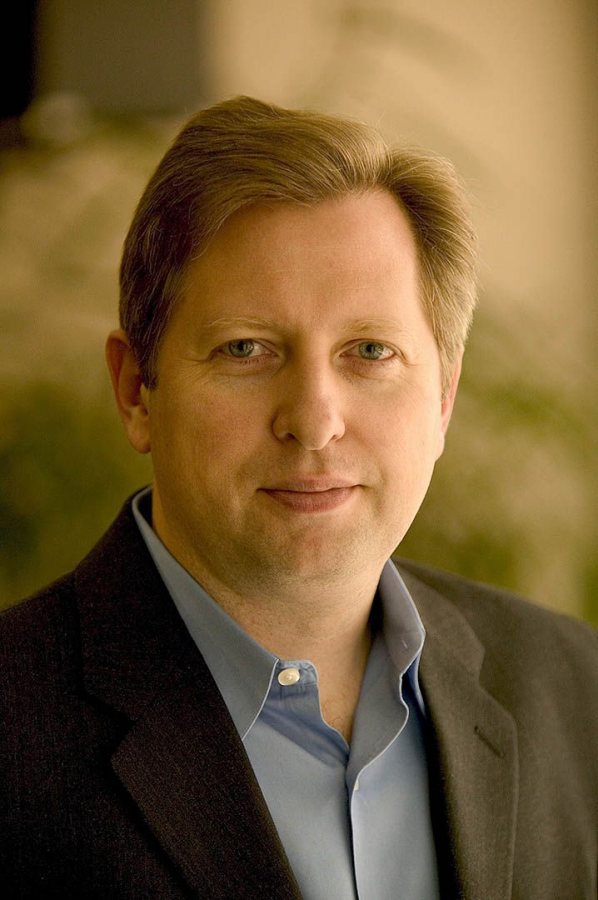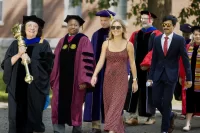
‘This I Believe’ co-creator to offer 2016 Convocation address
What’s the essence of what you believe? What’s the philosophical DNA that shapes your actions and words?
And if you had just a few minutes to share your core beliefs with the world, what would you say?
Bates’ incoming Class of 2020 devoted some time to such questions this summer. That’s because the 2016 Common Reading — the book that Bates asks incoming first-years to read before the start of school — represents the core philosophies, in their own words, of dozens of Americans from all walks of life.
Running the gamut from former Secretary of State Colin Powell and computing mogul Bill Gates to a Massachusetts hospital clerk and a Yellow Pages ad representative in Texas, those 80 Americans were contributors to the NPR radio series “This I Believe.”
The short essays that they read on the broadcast were adapted for a book with the same title. And nine years after its publication, the book This I Believe is the 2016 Common Reading at Bates.
Bates always follows up the summer reading assignment with programming during Orientation, and prominent in the programming this year is the Convocation address by Dan Gediman — an independent radio producer who, with producer Jay Allison, created “This I Believe” for NPR and edited the book.
Gediman will speak about This I Believe in the Convocation ceremony beginning at 11 a.m. Tuesday, Sept. 6. College President Clayton Spencer, Multifaith Chaplain Brittany Longsdorf, and the president of the Bates College Student Government, Adedire Fakorede ’18 of Newark, N.J., will also offer remarks.
Classes begin the following day.
The Common Reading is designed to jumpstart first-year students’ engagement with Bates both culturally and intellectually. Carrie Murphey ’06, assistant dean of students for first-year programs, explains that “This I Believe had particularly strong resonance with the Purposeful Work initiative,” a college-wide effort to help students harmonize their interests and beliefs with their life choices, especially in terms of career.
The essays in This I Believe inspire readers to examine their own personal beliefs, how they distilled them, and how they share them with others. “The book seemed a compelling choice, given the timing of the Common Reading, for first-year students as they consider their own guiding values and principles in preparation for four years of college,” Murphey says, “and for joining a community with many shared values.”
The longstanding Common Reading program was revised for 2016. Books being considered for the summer assignment are weighed against 18 goals that, taken together, describe a campus committed to diversity, community, mutual respect, and robust intellectuality.
The Common Reading is designed to jumpstart first-year students’ engagement with Bates both culturally and intellectually.
This year for the first time, Murphey says, books were assessed by a committee comprising faculty; students working in the residence life program; and staff. Murphey co-chaired the committee along with Kirk Read, professor of French and francophone studies, and Margaret Imber, associate professor of classical and medieval studies and Read’s successor as associate dean of the faculty.
In addition to Gediman’s address, This I Believe programming for first-year students includes a debate by Bates’ internationally known Brooks Quimby Debate Council, and pre-Convocation brunch discussions with guest staff or faculty discussants. In addition, some First-Year Seminars will incorporate the text into their syllabi.
The concept and title of This I Believe predated Gediman and Allison’s project by half a century. In 1951, a time of mounting political tensions in the United States, the renowned broadcast journalist Edward R. Murrow and the CBS network originated This I Believe as a series of five-minute radio spots in which well-known Americans shared the essence of their beliefs.
Today, Gediman is executive director of This I Believe, a nonprofit that collects and presents the core personal philosophies of Americans.
That show lasted into 1955. Allison and Gediman picked up where Murrow had left off some 50 years before — but they opened their 2005–09 public radio series to essays contributed by Americans from all walks of life. (They also re-used essays from Murrow’s series for both their radio and book series.)
The initial This I Believe book spawned a series that’s now up to nine volumes, and an Essay Collection of more than 120,000 statements of belief can be found at thisibelieve.org.
Today, Gediman is executive director of This I Believe, a nonprofit that collects and presents the core personal philosophies of Americans ranging from the famous to the previously unknown. A 25-year public radio veteran, his work has been heard on All Things Considered, Morning Edition, Fresh Air, Marketplace, and This American Life. He has won many of public broadcasting’s most prestigious awards.





